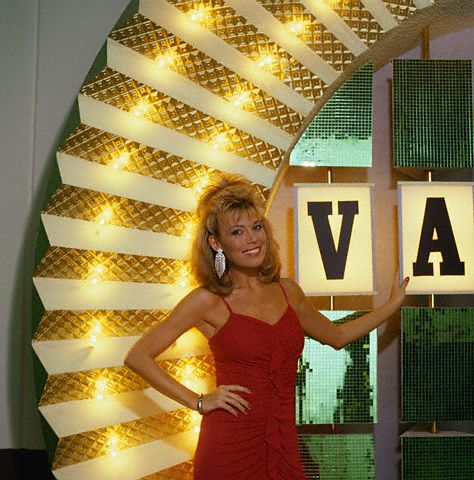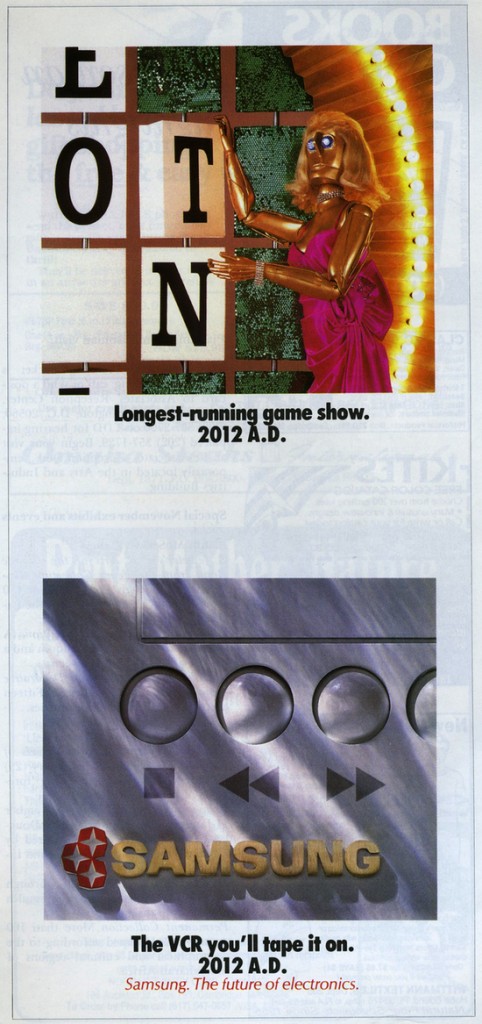Does Vanna White Seriously Have a Trademark on Revealing Letters on a Gameboard in a Dress?
Here is the latest in a series of examinations into urban legends about TV and whether they are true or false. Click here to view an archive of the TV urban legends featured so far.
TV URBAN LEGEND: Did Wheel of Fortune‘s Vanna White win a lawsuit over a commercial featuring a robot with a blond wig turning letters?
One of the most interesting “new” legal right that has developed over the past thirty years or so has been the California common law to publicity (also known as “personality rights”). In 1985, California passed a law known as the Celebrity Rights Act, which gives control to celebrities over the usage of their likeness, voice and signature during their life and then the control would be given to their estate for seventy years after the celebrity’s death. This statute is why Fred Astaire’s estate can follow the strange stipulation in his will that he never be depicted in a film (you can read more about that odd decision in this old Legends Revealed here). However, while California has specifically codified this law, courts have also granted a certain amount of protection beyond that law to celebrities and their publicity rights. This protection has gotten more and more protective over the last thirty years. Perhaps the most dramatic example of this right came in 1988, when Wheel of Fortune‘s Vanna White sued Samsung Electronics over an ad depicting a robot in a blond wig turning letters…and essentially won!
Read on to see how it all went down…
Wheel of Fortune had been a daytime game show on NBC that debuted in 1975 in which contestants essentially play Hangman, spinning a large wheel to determine how much money they would receive for correctly guessing a consonant from a large word puzzle placed before them. A female hostess would reveal the correctly guessed letters to the contestant and the audience. In 1980, though, the original host, Chuck Woolery, left the program and was replaced by Pat Sajak. In 1982, original hostess Susan Stafford left the program and was replaced by a few aspiring fill-in hostesses. In December of 1982, one of those hostesses, Vanna White, won the job. White’s timing was impeccable as in 1983, the show was picked up for syndication. From 1983-1991, the show would air in the daytime on NBC and then air at nighttime on syndication (where any local network could purchase the right to air the program). The show exploded in popularity when it hit syndication and to this very day, it remains the most popular original program in syndication (beat only by Big Bang Theory syndicated reruns). Sajak and White remain the hosts of the program.

In 1988, Samsung Electronics began a series of print advertisements created for them by the advertising firm of David Deutsch Associates, Inc. The concept of the ads was that in the future, outlandish things would take place but Samsung would still be there. One of the ads suggested that in 2010, steak would be considered a “health food,” but Samsung microwaves would still be there to heat up the steak. In 2008, controversial talk show host Morton Downey Jr. would be a presidential candidate and Samsung TVs would still be around for you to view Downey’s speeches. Finally, one ad showed a robot with a blonde wig wearing a dress turning a letter on a game board. The ad noted that in 2012, this would be the longest-running game show and you would still be using a Samsung VCR to record it. White sued over the ads.

Originally, the California District Court ruled against her, throwing the case out of of court. However, in 1992, after White appealed the lower court’s ruling, the Ninth Circuit Court of Appeals reversed the original decision on two of the three grounds White used.
White sued based on the aforementioned Celebrity Rights Act, but also based on the California common law to publicity (personality rights) as well as over a trademark violation! The Court of Appeals agreed that the suit did not fit the parameters of the Celebrity Rights Act, as the ads had not depicted her likeness, her voice or her signature. However, on the matter of her personality rights, they determined that White had an actionable claim. They ruled that it was
not important how the defendant has appropriated the plaintiff’s identity, but whether the defendant has done so.
and in this instance, they felt Samsung had, indeed, appropriated White’s identity, noting
Advertisers use celebrities to promote their products. The more popular the celebrity, the greater the number of people who recognize her, and the greater the visibility for the product. The identities of the most popular celebrities are not only the most attractive for advertisers, but also the easiest to evoke without resorting to obvious means such as name, likeness, or voice.
They noted that even the defendants themselves referred to the ads as “the Vanna White ad.” Essentially, Samsung was using everyone’s familiarity with Vanna White to sell their product only they were neither compensating Vanna White to do so nor did they ask for White’s permission to do so. Downey Jr., for instance, was compensated for appearing in his ad. As they noted:
Viewed separately, the individual aspects of the advertisement in the present case say little. Viewed together, they leave little doubt about the celebrity the ad is meant to depict. The female-shaped robot is wearing a long gown, blond wig, and large jewelry. Vanna White dresses exactly like this at times, but so do many other women. The robot is in the process of turning a block letter on a game-board. Vanna White dresses like this while turning letters on a game-board but perhaps similarly attired Scrabble-playing women do this as well. The robot is standing on what looks to be the Wheel of Fortune game show set. Vanna White dresses like this, turns letters, and does this on the Wheel of Fortune game show. She is the only one.
Similarly, they determined that White could at least make a legitimate claim that the ads would confuse consumers into believing that White was endorsing Samsung products, noting
Looking at the series of advertisements as a whole, a jury could reasonably conclude that beneath the surface humor of the series lay an intent to persuade consumers that celebrity Vanna White, like celebrity Downey, was endorsing Samsung products.
They, of course, noted that the jury could disagree with White’s claims, as they could disagree with her claims on the matter of her above cited personality rights, but White at least had an actionable case that the court would allow get to a jury to allow the jury to decide. Samsung tried to get the Court of Appeals to rehear the case the following year (under a different panel of judges) but their claim was denied. That denial did lead to a famous dissent by Judge Alex Kozinski, where he colorfully ripped into the case. Samsung eventually settled with White in 1993 after the United State Supreme Court denied hearing the case. They paid White over $400,000.
The legend is…
STATUS: Basically True (except it is worth noting that the case never went to verdict, so she did not officially win, but she clearly won.
Feel free (heck, I implore you!) to write in with your suggestions for future installments! My e-mail address is bcronin@legendsrevealed.com.






If I remember correctly, there was also an ad showing the World Trade Center, labelled ‘low-rises’ (I can’t remember the year it gave).
The funniest part of that ad is that it is now 2012 (well, 2013, but you know what I mean) and Wheel of Fortune is STILL on the air, Vanna is STILL turning letters, but VCRs are more or less completely obsolete.
Yeah, it really is funny how hard it is to predict future technology. Heck, just 8 years ago you would have predicted that cell phones would be minuscule in 2013 and instead they’re bigger than they’ve been since the 1990s!
Interesting that they thought that Wheel would be the longest running game show, which means they apparently thought that The Price is Right would have run its course by 2012. While I haven’t watched Wheel in many years, I respect that it’s still Vanna and not a younger woman.